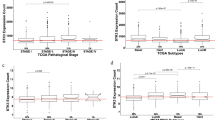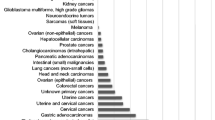Abstract
Midkine overexpression has been shown to be a tumor biomarker in several types of human cancer, but little is known about the clinical significance of midkine in breast cancer patients. The aim of this study was to analyze the expression of midkine in breast cancer and its correlation with clinicopathological characteristics, including breast cancer patient’s survival. The expression status of midkine in breast cancer from Gene Expression Omnibus (GEO accession number: GDS3853) was observed initially. Furthermore, the expression of midkine messenger RNA (mRNA) and protein was examined in breast cancer and normal mammary tissues through real-time PCR and immunohistochemistry. Moreover, the relationship of midkine protein expression with clinical characteristics of 170 breast cancer patients was analyzed by immunohistochemistry. In our results, midkine was up-expressed in breast cancer tissues compared with normal mammary tissues in microarray data (GDS3853). Midkine mRNA and protein expression was significantly increased in breast cancer tissues than in normal mammary tissues. By immunohistochemistry, high levels of midkine protein were positively associated with the status of clinical stage, T classification, N classification, and M classification in breast cancer patients. Furthermore, midkine overexpression was an independent poor prognostic indicator for the survival of patients with breast cancer. In conclusion, overexpression of midkine protein serves as an unfavorable prognostic biomarker in breast cancer patients.




Similar content being viewed by others
References
Allemani C, Weir HK, Carreira H, Harewood R, Spika D, Wang XS, et al. Global surveillance of cancer survival 1995-2009: analysis of individual data for 25,676,887 patients from 279 population-based registries in 67 countries (CONCORD-2). Lancet. 2015;385:977–1010.
Lu J, Steeg PS, Price JE, Krishnamurthy S, Mani SA, Reuben J, et al. Breast cancer metastasis: challenges and opportunities. Cancer Res. 2009;69:4951–3.
Siegel RL, Miller KD, Jemal A. Cancer statistics, 2015. CA Cancer J Clin. 2015;65:5–29.
Bombonati A, Sgroi DC. The molecular pathology of breast cancer progression. J Pathol. 2011;223:307–17.
Murasugi A, Tohma-Aiba Y. Production of native recombinant human midkine in the yeast, Pichia pastoris. Protein Expr Purif. 2003;27:244–52.
Kadomatsu K, Muramatsu T. Midkine and pleiotrophin in neural development and cancer. Cancer Lett. 2004;204:127–43.
Qi M, Ikematsu S, Maeda N, Ichihara-Tanaka K, Sakuma S, Noda M, et al. Haptotactic migration induced by midkine. Involvement of protein-tyrosine phosphatase zeta. Mitogen-activated protein kinase, and phosphatidylinositol 3-kinase. J Biol Chem. 2001;276:15868–75.
Muramatsu T. Midkine and pleiotrophin: two related proteins involved in development, survival, inflammation and tumorigenesis. J Biochem. 2002;132:359–71.
Choudhuri R, Zhang HT, Donnini S, Ziche M, Bicknell R. An angiogenic role for the neurokines midkine and pleiotrophin in tumorigenesis. Cancer Res. 1997;57:1814–9.
Kadomatsu K, Hagihara M, Akhter S, Fan QW, Muramatsu H, Muramatsu T. Midkine induces the transformation of NIH3T3 cells. Br J Cancer. 1997;75:354–9.
Ota K, Fujimori H, Ueda M, Shiniriki S, Kudo M, Jono H, et al. Midkine as a prognostic biomarker in oral squamous cell carcinoma. Br J Cancer. 2008;99:655–62.
Aridome K, Tsutsui J, Takao S, Kadomatsu K, Ozawa M, Aikou T, et al. Increased midkine gene expression in human gastrointestinal cancers. Jpn J Cancer Res. 1995;86:655–61.
Ye C, Qi M, Fan QW, Ito K, Akiyama S, Kasai Y, et al. Expression of midkine in the early stage of carcinogenesis in human colorectal cancer. Br J Cancer. 1999;79:179–84.
Kato M, Shinozawa T, Kato S, Awaya A, Terada T. Increased midkine expression in hepatocellular carcinoma. Arch Pathol Lab Med. 2000;124:848–52.
Kato M, Shinozawa T, Kato S, Endo K, Terada T. Increased midkine expression in intrahepatic cholangiocarcinoma: immunohistochemical and in situ hybridization analyses. Liver. 2000;20:216–21.
Ma Z, Li H, Wang B, Shen Q, Cui E, Min L, et al. Midkine mRNA level in peripheral blood mononuclear cells is a novel biomarker for primary non-small cell lung cancer: a prospective study. J Cancer Res Clin Oncol. 2013;139:557–62.
Kato M, Maeta H, Kato S, Shinozawa T, Terada T. Immunohistochemical and in situ hybridization analyses of midkine expression in thyroid papillary carcinoma. Mod Pathol. 2000;13:1060–5.
Hidaka H, Yagasaki H, Takahashi Y, Hama A, Nishio N, Tanaka M, et al. Increased midkine gene expression in childhood B-precursor acute lymphoblastic leukemia. Leuk Res. 2007;31:1045–51.
Moon HS, Park WI, Sung SH, Choi EA, Chung HW, Woo BH. Immunohistochemical and quantitative competitive PCR analyses of midkine and pleiotrophin expression in cervical cancer. Gynecol Oncol. 2003;88:289–97.
Nakanishi T, Kadomatsu K, Okamoto T, Tomoda Y, Muramatsu T. Expression of midkine and pleiotropin in ovarian tumors. Obstet Gynecol. 1997;90:285–90.
Konishi N, Nakamura M, Nakaoka S, Hiasa Y, Cho M, Uemura H, et al. Immunohistochemical analysis of midkine expression in human prostate carcinoma. Oncology. 1999;57:253–7.
Luo W, Li S, Peng B, Ye Y, Deng X, Yao K. Embryonic stem cells markers SOX2, OCT4 and Nanog expression and their correlations with epithelial-mesenchymal transition in nasopharyngeal carcinoma. PLoS One. 2013;8, e56324.
Muramatsu T. Midkine, a heparin-binding cytokine with multiple roles in development, repair and diseases. Proce Jpn Acad Ser B Phys Biolog Sci. 2010;86:410–25.
Ikematsu S, Yano A, Aridome K, Kikuchi M, Kumai H, Nagano H, et al. Serum midkine levels are increased in patients with various types of carcinomas. Br J Cancer. 2000;83:701–6.
Ibusuki M, Fujimori H, Yamamoto Y, Ota K, Ueda M, Shinriki S, et al. Midkine in plasma as a novel breast cancer marker. Cancer Sci. 2009;100:1735–9.
Kretschmer C, Sterner-Kock A, Siedentopf F, Schoenegg W, Schlag PM, Kemmner W. Identification of early molecular markers for breast cancer. Mol Cancer. 2011;10:15.
Qin Li L, Huang HL, Ping JL, Xu W, Li J, Dai LC. Expression of midkine and endoglin in breast carcinomas with different immunohistochemical profiles. APMIS. 2011;119:103–10.
Shimada H, Nabeya Y, Tagawa M, Okazumi S, Matsubara H, Kadomatsu K, et al. Preoperative serum midkine concentration is a prognostic marker for esophageal squamous cell carcinoma. Cancer Sci. 2003;94:628–32.
Zhu WW, Guo JJ, Guo L, Jia HL, Zhu M, Zhang JB, et al. Evaluation of midkine as a diagnostic serum biomarker in hepatocellular carcinoma. Clin Cancer Res. 2013;19:3944–54.
Ota K, Fujimori H, Ueda M, Jono H, Shinriki S, Ota T, et al. Midkine expression is correlated with an adverse prognosis and is down-regulated by p53 in oral squamous cell carcinoma. Int J Oncol. 2010;37:797–804.
Zhao ZQ, Yang S, Lu HS. Expression of midkine and vascular endothelial growth factor in gastric cancer and the association of high levels with poor prognosis and survival. Mol Med Rep. 2012;5:415–9.
Conflicts of interest
None
Author information
Authors and Affiliations
Corresponding author
Additional information
Fuguang Li and Peijun Tian are co-first authors.
Rights and permissions
About this article
Cite this article
Li, F., Tian, P., Zhang, J. et al. The clinical and prognostic significance of midkine in breast cancer patients. Tumor Biol. 36, 9789–9794 (2015). https://doi.org/10.1007/s13277-015-3710-x
Received:
Accepted:
Published:
Issue Date:
DOI: https://doi.org/10.1007/s13277-015-3710-x




